Report on Travelodge joining International Tourism Partnership (ITP)
VerifiedAdded on 2023/01/11
|8
|1542
|48
Report
AI Summary
This report assesses whether Travelodge, a global hotel chain located in London, should join the International Tourism Partnership (ITP) to reduce carbon emissions and achieve sustainable growth. It focuses on increasing the efficiency of equipment and operations within Travelodge, such as using LED lighting, upgrading equipment, and streamlining hotel operations. The report discusses the positive impacts of these factors, including sustainable development, green marketing, and competitive advantage. It also addresses challenges like increased costs and workforce training. The analysis concludes that adopting sustainable practices and joining ITP can significantly reduce Travelodge's carbon footprint and enhance its market position. Desklib provides access to similar reports and study resources for students.

Hospitality and
Tourism Issues
Tourism Issues
Paraphrase This Document
Need a fresh take? Get an instant paraphrase of this document with our AI Paraphraser
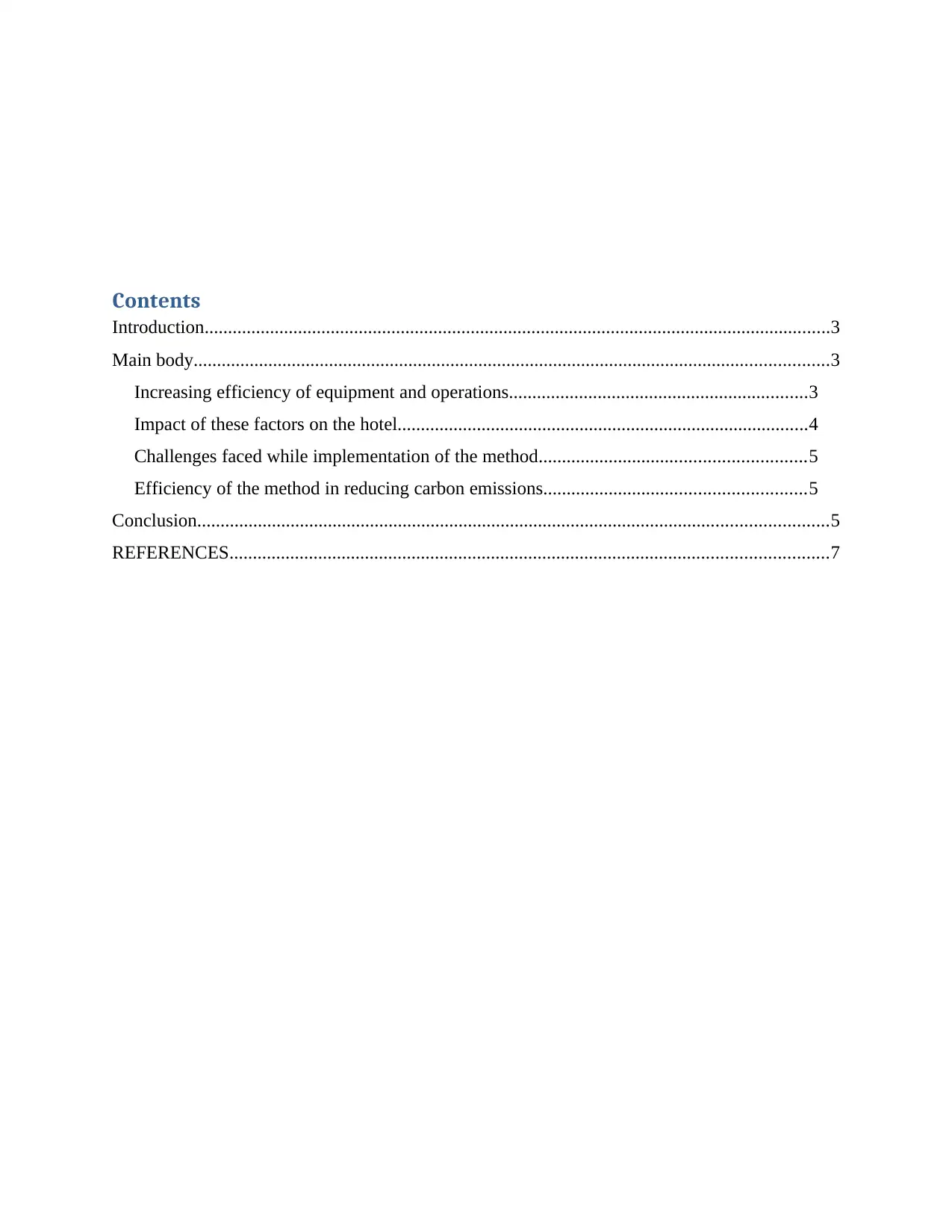
Contents
Introduction......................................................................................................................................3
Main body........................................................................................................................................3
Increasing efficiency of equipment and operations................................................................3
Impact of these factors on the hotel........................................................................................4
Challenges faced while implementation of the method.........................................................5
Efficiency of the method in reducing carbon emissions........................................................5
Conclusion.......................................................................................................................................5
REFERENCES................................................................................................................................7
Introduction......................................................................................................................................3
Main body........................................................................................................................................3
Increasing efficiency of equipment and operations................................................................3
Impact of these factors on the hotel........................................................................................4
Challenges faced while implementation of the method.........................................................5
Efficiency of the method in reducing carbon emissions........................................................5
Conclusion.......................................................................................................................................5
REFERENCES................................................................................................................................7
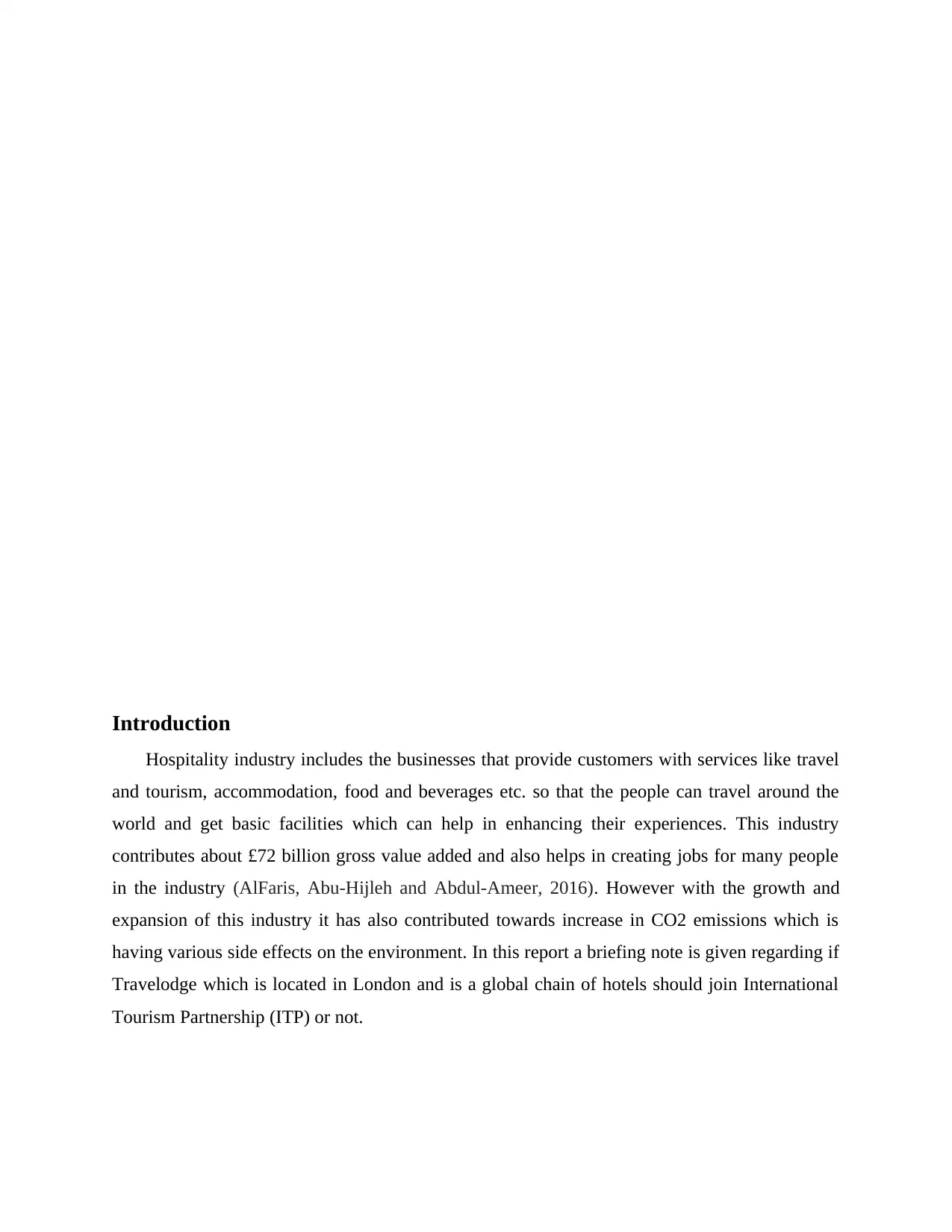
Introduction
Hospitality industry includes the businesses that provide customers with services like travel
and tourism, accommodation, food and beverages etc. so that the people can travel around the
world and get basic facilities which can help in enhancing their experiences. This industry
contributes about £72 billion gross value added and also helps in creating jobs for many people
in the industry (AlFaris, Abu-Hijleh and Abdul-Ameer, 2016). However with the growth and
expansion of this industry it has also contributed towards increase in CO2 emissions which is
having various side effects on the environment. In this report a briefing note is given regarding if
Travelodge which is located in London and is a global chain of hotels should join International
Tourism Partnership (ITP) or not.
Hospitality industry includes the businesses that provide customers with services like travel
and tourism, accommodation, food and beverages etc. so that the people can travel around the
world and get basic facilities which can help in enhancing their experiences. This industry
contributes about £72 billion gross value added and also helps in creating jobs for many people
in the industry (AlFaris, Abu-Hijleh and Abdul-Ameer, 2016). However with the growth and
expansion of this industry it has also contributed towards increase in CO2 emissions which is
having various side effects on the environment. In this report a briefing note is given regarding if
Travelodge which is located in London and is a global chain of hotels should join International
Tourism Partnership (ITP) or not.
⊘ This is a preview!⊘
Do you want full access?
Subscribe today to unlock all pages.

Trusted by 1+ million students worldwide
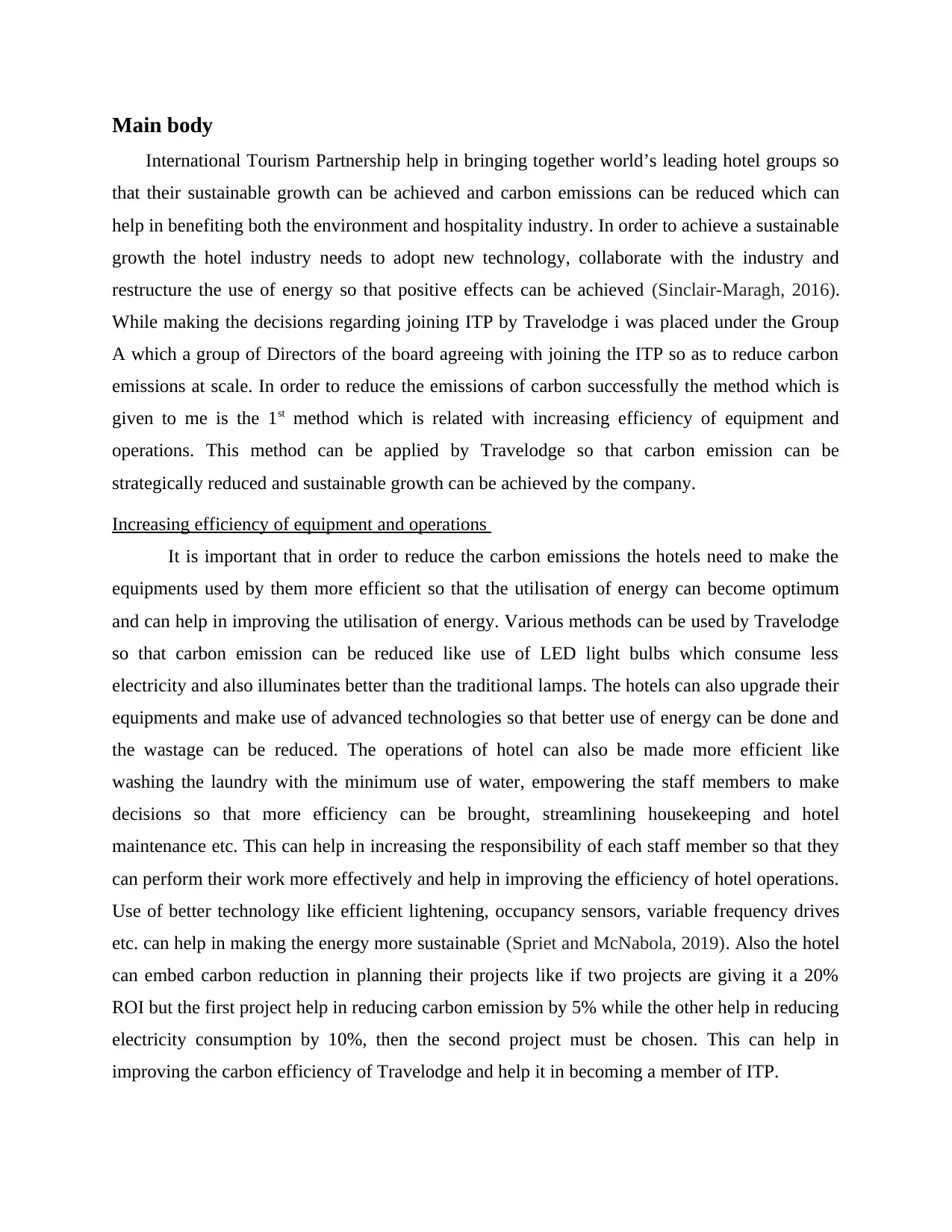
Main body
International Tourism Partnership help in bringing together world’s leading hotel groups so
that their sustainable growth can be achieved and carbon emissions can be reduced which can
help in benefiting both the environment and hospitality industry. In order to achieve a sustainable
growth the hotel industry needs to adopt new technology, collaborate with the industry and
restructure the use of energy so that positive effects can be achieved (Sinclair-Maragh, 2016).
While making the decisions regarding joining ITP by Travelodge i was placed under the Group
A which a group of Directors of the board agreeing with joining the ITP so as to reduce carbon
emissions at scale. In order to reduce the emissions of carbon successfully the method which is
given to me is the 1st method which is related with increasing efficiency of equipment and
operations. This method can be applied by Travelodge so that carbon emission can be
strategically reduced and sustainable growth can be achieved by the company.
Increasing efficiency of equipment and operations
It is important that in order to reduce the carbon emissions the hotels need to make the
equipments used by them more efficient so that the utilisation of energy can become optimum
and can help in improving the utilisation of energy. Various methods can be used by Travelodge
so that carbon emission can be reduced like use of LED light bulbs which consume less
electricity and also illuminates better than the traditional lamps. The hotels can also upgrade their
equipments and make use of advanced technologies so that better use of energy can be done and
the wastage can be reduced. The operations of hotel can also be made more efficient like
washing the laundry with the minimum use of water, empowering the staff members to make
decisions so that more efficiency can be brought, streamlining housekeeping and hotel
maintenance etc. This can help in increasing the responsibility of each staff member so that they
can perform their work more effectively and help in improving the efficiency of hotel operations.
Use of better technology like efficient lightening, occupancy sensors, variable frequency drives
etc. can help in making the energy more sustainable (Spriet and McNabola, 2019). Also the hotel
can embed carbon reduction in planning their projects like if two projects are giving it a 20%
ROI but the first project help in reducing carbon emission by 5% while the other help in reducing
electricity consumption by 10%, then the second project must be chosen. This can help in
improving the carbon efficiency of Travelodge and help it in becoming a member of ITP.
International Tourism Partnership help in bringing together world’s leading hotel groups so
that their sustainable growth can be achieved and carbon emissions can be reduced which can
help in benefiting both the environment and hospitality industry. In order to achieve a sustainable
growth the hotel industry needs to adopt new technology, collaborate with the industry and
restructure the use of energy so that positive effects can be achieved (Sinclair-Maragh, 2016).
While making the decisions regarding joining ITP by Travelodge i was placed under the Group
A which a group of Directors of the board agreeing with joining the ITP so as to reduce carbon
emissions at scale. In order to reduce the emissions of carbon successfully the method which is
given to me is the 1st method which is related with increasing efficiency of equipment and
operations. This method can be applied by Travelodge so that carbon emission can be
strategically reduced and sustainable growth can be achieved by the company.
Increasing efficiency of equipment and operations
It is important that in order to reduce the carbon emissions the hotels need to make the
equipments used by them more efficient so that the utilisation of energy can become optimum
and can help in improving the utilisation of energy. Various methods can be used by Travelodge
so that carbon emission can be reduced like use of LED light bulbs which consume less
electricity and also illuminates better than the traditional lamps. The hotels can also upgrade their
equipments and make use of advanced technologies so that better use of energy can be done and
the wastage can be reduced. The operations of hotel can also be made more efficient like
washing the laundry with the minimum use of water, empowering the staff members to make
decisions so that more efficiency can be brought, streamlining housekeeping and hotel
maintenance etc. This can help in increasing the responsibility of each staff member so that they
can perform their work more effectively and help in improving the efficiency of hotel operations.
Use of better technology like efficient lightening, occupancy sensors, variable frequency drives
etc. can help in making the energy more sustainable (Spriet and McNabola, 2019). Also the hotel
can embed carbon reduction in planning their projects like if two projects are giving it a 20%
ROI but the first project help in reducing carbon emission by 5% while the other help in reducing
electricity consumption by 10%, then the second project must be chosen. This can help in
improving the carbon efficiency of Travelodge and help it in becoming a member of ITP.
Paraphrase This Document
Need a fresh take? Get an instant paraphrase of this document with our AI Paraphraser
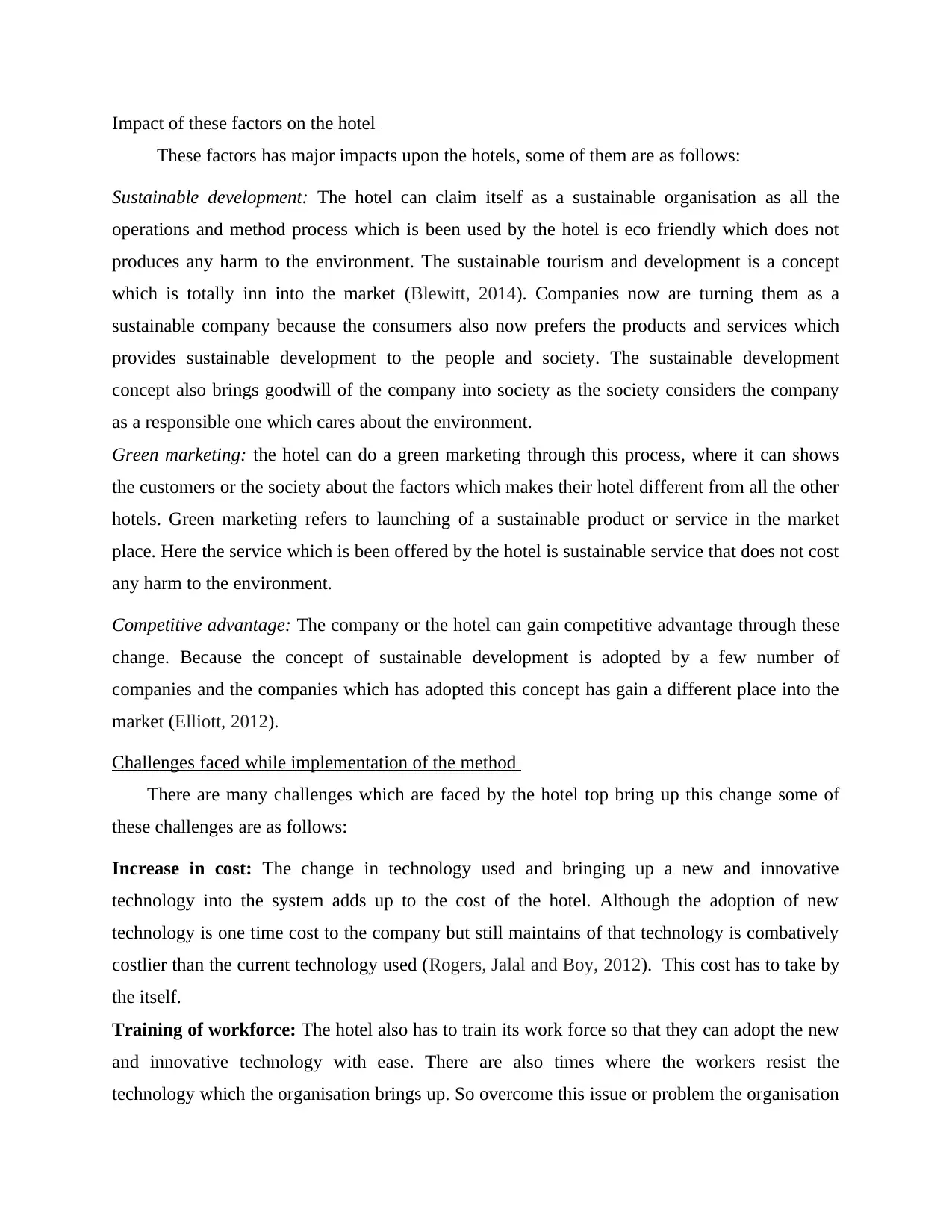
Impact of these factors on the hotel
These factors has major impacts upon the hotels, some of them are as follows:
Sustainable development: The hotel can claim itself as a sustainable organisation as all the
operations and method process which is been used by the hotel is eco friendly which does not
produces any harm to the environment. The sustainable tourism and development is a concept
which is totally inn into the market (Blewitt, 2014). Companies now are turning them as a
sustainable company because the consumers also now prefers the products and services which
provides sustainable development to the people and society. The sustainable development
concept also brings goodwill of the company into society as the society considers the company
as a responsible one which cares about the environment.
Green marketing: the hotel can do a green marketing through this process, where it can shows
the customers or the society about the factors which makes their hotel different from all the other
hotels. Green marketing refers to launching of a sustainable product or service in the market
place. Here the service which is been offered by the hotel is sustainable service that does not cost
any harm to the environment.
Competitive advantage: The company or the hotel can gain competitive advantage through these
change. Because the concept of sustainable development is adopted by a few number of
companies and the companies which has adopted this concept has gain a different place into the
market (Elliott, 2012).
Challenges faced while implementation of the method
There are many challenges which are faced by the hotel top bring up this change some of
these challenges are as follows:
Increase in cost: The change in technology used and bringing up a new and innovative
technology into the system adds up to the cost of the hotel. Although the adoption of new
technology is one time cost to the company but still maintains of that technology is combatively
costlier than the current technology used (Rogers, Jalal and Boy, 2012). This cost has to take by
the itself.
Training of workforce: The hotel also has to train its work force so that they can adopt the new
and innovative technology with ease. There are also times where the workers resist the
technology which the organisation brings up. So overcome this issue or problem the organisation
These factors has major impacts upon the hotels, some of them are as follows:
Sustainable development: The hotel can claim itself as a sustainable organisation as all the
operations and method process which is been used by the hotel is eco friendly which does not
produces any harm to the environment. The sustainable tourism and development is a concept
which is totally inn into the market (Blewitt, 2014). Companies now are turning them as a
sustainable company because the consumers also now prefers the products and services which
provides sustainable development to the people and society. The sustainable development
concept also brings goodwill of the company into society as the society considers the company
as a responsible one which cares about the environment.
Green marketing: the hotel can do a green marketing through this process, where it can shows
the customers or the society about the factors which makes their hotel different from all the other
hotels. Green marketing refers to launching of a sustainable product or service in the market
place. Here the service which is been offered by the hotel is sustainable service that does not cost
any harm to the environment.
Competitive advantage: The company or the hotel can gain competitive advantage through these
change. Because the concept of sustainable development is adopted by a few number of
companies and the companies which has adopted this concept has gain a different place into the
market (Elliott, 2012).
Challenges faced while implementation of the method
There are many challenges which are faced by the hotel top bring up this change some of
these challenges are as follows:
Increase in cost: The change in technology used and bringing up a new and innovative
technology into the system adds up to the cost of the hotel. Although the adoption of new
technology is one time cost to the company but still maintains of that technology is combatively
costlier than the current technology used (Rogers, Jalal and Boy, 2012). This cost has to take by
the itself.
Training of workforce: The hotel also has to train its work force so that they can adopt the new
and innovative technology with ease. There are also times where the workers resist the
technology which the organisation brings up. So overcome this issue or problem the organisation
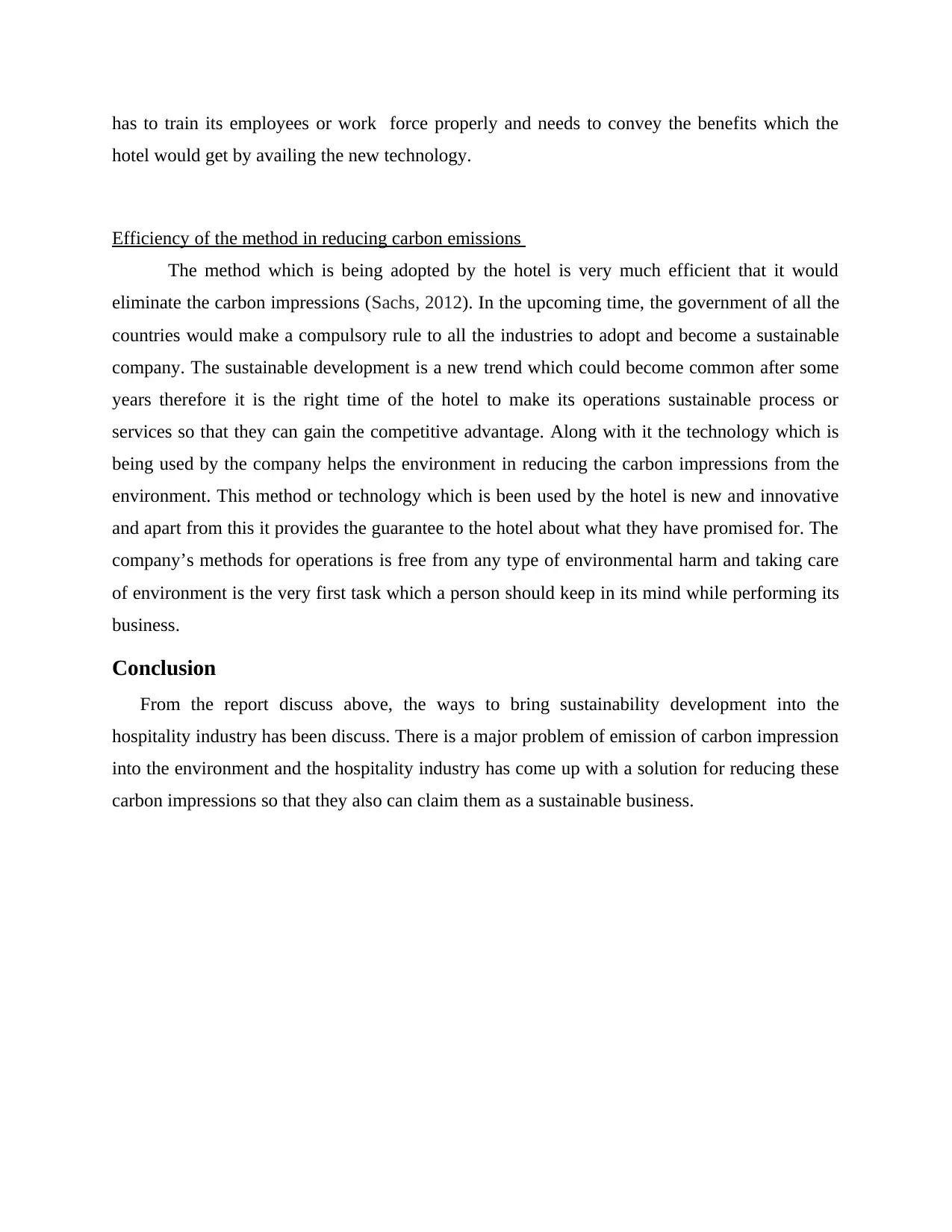
has to train its employees or work force properly and needs to convey the benefits which the
hotel would get by availing the new technology.
Efficiency of the method in reducing carbon emissions
The method which is being adopted by the hotel is very much efficient that it would
eliminate the carbon impressions (Sachs, 2012). In the upcoming time, the government of all the
countries would make a compulsory rule to all the industries to adopt and become a sustainable
company. The sustainable development is a new trend which could become common after some
years therefore it is the right time of the hotel to make its operations sustainable process or
services so that they can gain the competitive advantage. Along with it the technology which is
being used by the company helps the environment in reducing the carbon impressions from the
environment. This method or technology which is been used by the hotel is new and innovative
and apart from this it provides the guarantee to the hotel about what they have promised for. The
company’s methods for operations is free from any type of environmental harm and taking care
of environment is the very first task which a person should keep in its mind while performing its
business.
Conclusion
From the report discuss above, the ways to bring sustainability development into the
hospitality industry has been discuss. There is a major problem of emission of carbon impression
into the environment and the hospitality industry has come up with a solution for reducing these
carbon impressions so that they also can claim them as a sustainable business.
hotel would get by availing the new technology.
Efficiency of the method in reducing carbon emissions
The method which is being adopted by the hotel is very much efficient that it would
eliminate the carbon impressions (Sachs, 2012). In the upcoming time, the government of all the
countries would make a compulsory rule to all the industries to adopt and become a sustainable
company. The sustainable development is a new trend which could become common after some
years therefore it is the right time of the hotel to make its operations sustainable process or
services so that they can gain the competitive advantage. Along with it the technology which is
being used by the company helps the environment in reducing the carbon impressions from the
environment. This method or technology which is been used by the hotel is new and innovative
and apart from this it provides the guarantee to the hotel about what they have promised for. The
company’s methods for operations is free from any type of environmental harm and taking care
of environment is the very first task which a person should keep in its mind while performing its
business.
Conclusion
From the report discuss above, the ways to bring sustainability development into the
hospitality industry has been discuss. There is a major problem of emission of carbon impression
into the environment and the hospitality industry has come up with a solution for reducing these
carbon impressions so that they also can claim them as a sustainable business.
⊘ This is a preview!⊘
Do you want full access?
Subscribe today to unlock all pages.

Trusted by 1+ million students worldwide
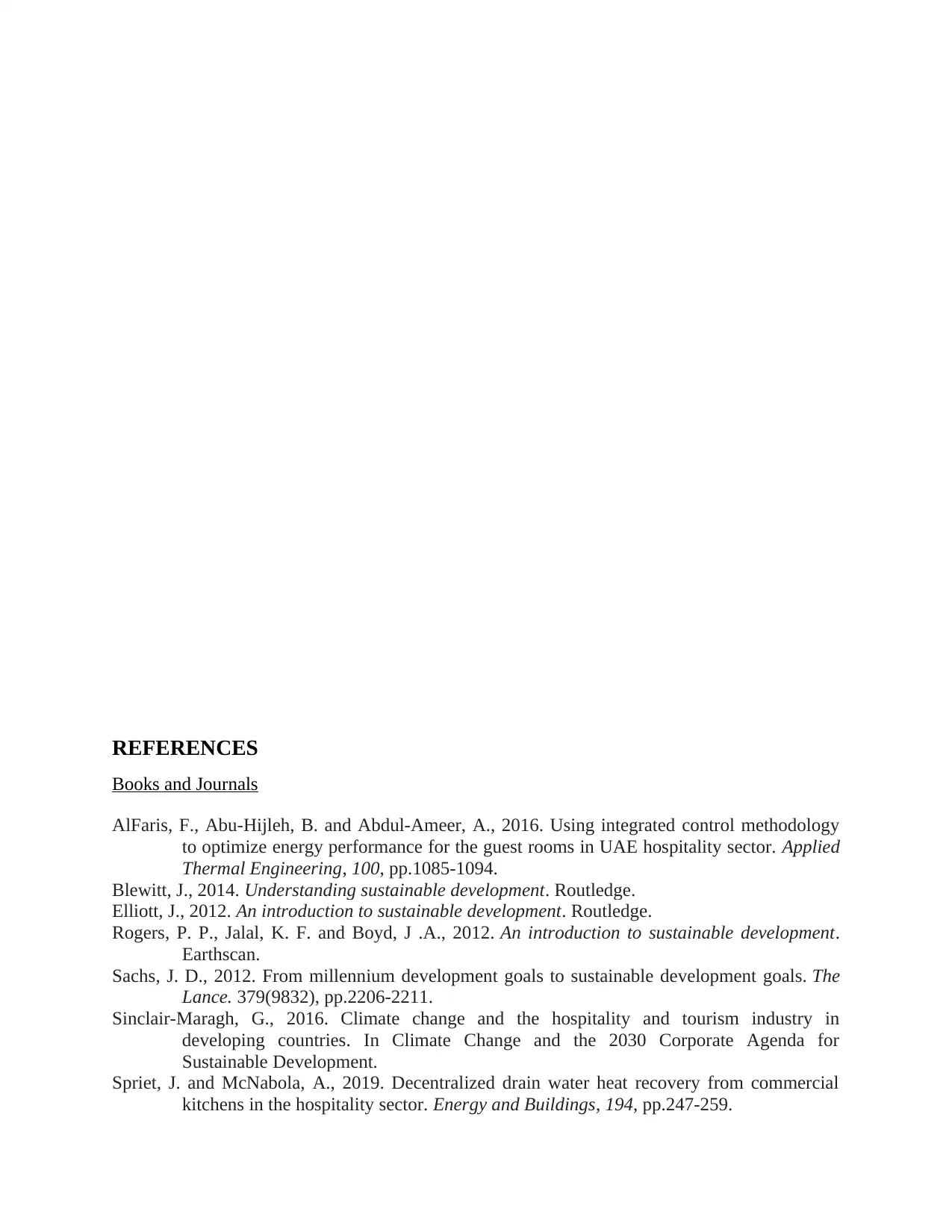
REFERENCES
Books and Journals
AlFaris, F., Abu-Hijleh, B. and Abdul-Ameer, A., 2016. Using integrated control methodology
to optimize energy performance for the guest rooms in UAE hospitality sector. Applied
Thermal Engineering, 100, pp.1085-1094.
Blewitt, J., 2014. Understanding sustainable development. Routledge.
Elliott, J., 2012. An introduction to sustainable development. Routledge.
Rogers, P. P., Jalal, K. F. and Boyd, J .A., 2012. An introduction to sustainable development.
Earthscan.
Sachs, J. D., 2012. From millennium development goals to sustainable development goals. The
Lance. 379(9832), pp.2206-2211.
Sinclair-Maragh, G., 2016. Climate change and the hospitality and tourism industry in
developing countries. In Climate Change and the 2030 Corporate Agenda for
Sustainable Development.
Spriet, J. and McNabola, A., 2019. Decentralized drain water heat recovery from commercial
kitchens in the hospitality sector. Energy and Buildings, 194, pp.247-259.
Books and Journals
AlFaris, F., Abu-Hijleh, B. and Abdul-Ameer, A., 2016. Using integrated control methodology
to optimize energy performance for the guest rooms in UAE hospitality sector. Applied
Thermal Engineering, 100, pp.1085-1094.
Blewitt, J., 2014. Understanding sustainable development. Routledge.
Elliott, J., 2012. An introduction to sustainable development. Routledge.
Rogers, P. P., Jalal, K. F. and Boyd, J .A., 2012. An introduction to sustainable development.
Earthscan.
Sachs, J. D., 2012. From millennium development goals to sustainable development goals. The
Lance. 379(9832), pp.2206-2211.
Sinclair-Maragh, G., 2016. Climate change and the hospitality and tourism industry in
developing countries. In Climate Change and the 2030 Corporate Agenda for
Sustainable Development.
Spriet, J. and McNabola, A., 2019. Decentralized drain water heat recovery from commercial
kitchens in the hospitality sector. Energy and Buildings, 194, pp.247-259.
Paraphrase This Document
Need a fresh take? Get an instant paraphrase of this document with our AI Paraphraser

1 out of 8
Related Documents
Your All-in-One AI-Powered Toolkit for Academic Success.
+13062052269
info@desklib.com
Available 24*7 on WhatsApp / Email
![[object Object]](/_next/static/media/star-bottom.7253800d.svg)
Unlock your academic potential
Copyright © 2020–2025 A2Z Services. All Rights Reserved. Developed and managed by ZUCOL.




